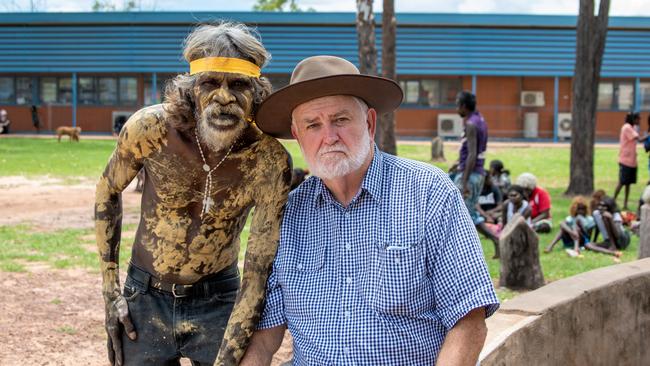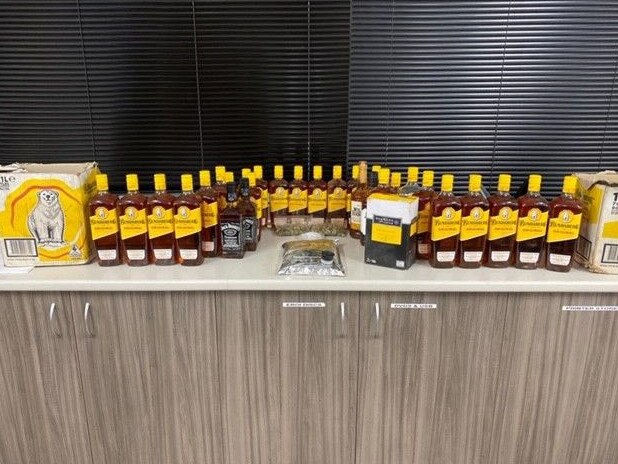Covid-fuelled grog violence hits remote kids
Illicit alcohol floods into Wadeye, with public drunkenness and violence forcing families to flee to the bush.

School attendance in the remote Northern Territory community of Wadeye has plummeted amid an outbreak of alcohol-fuelled violence that has stemmed from an increase to welfare payments designed to offset the impacts of the coronavirus.
John Young, principal of Our Lady of the Sacred Heart Thamarrurr Catholic College, has told The Weekend Australian that a significant number of the school’s 600 students have been absent for several months, with the attendance rate dropping to about 30 per cent.
Teachers and school staff were also struggling to turn up to work regularly, he said, as they battled fatigue as a result of being kept up throughout the night as alcohol wreaked havoc on the community where the consumption of liquor is restricted.
“There’s been a huge increase in public drunkenness — people are drinking all night. There’s fighting, and the yelling and noise is constant,” Dr Young said.

“A lot of families have moved out of town and gone back on country to escape the drunks, and the kids aren’t coming to school.”
Wadeye, which is located 400km southwest of Darwin, was one of 76 remote communities in the Territory locked down under the Biosecurity Act at the start of the pandemic.
With a population of about 2300, it is one of the largest remote indigenous communities but also among the most disadvantaged.
At the time of the 2016 Census, 44.5 per cent of adults were unemployed and the family income was just a third of the national average.
According to Dr Young, many of the locals had benefited from the increased welfare allowances since March, with the federal government’s coronavirus supplement effectively doubling payments to the unemployed, single parents and students.
However, the cash appeared to have fuelled a surge in gambling, he said, as residents ran “all-night casinos” playing card games on the verandas of their homes.
“We were hearing reports of 14-year-old kids winning big money,” he said.
“By the time the biosecurity measures were lifted, everyone had been locked up for some time and had a lot of money. Some went to Darwin and were buying cars … and that’s when the illegal grog really started flooding in.”
A spokesman for indigenous Australians Minister Ken Wyatt said the minister was aware of the situation in Wadeye and understood Northern Territory Police had been meeting with community leaders to resolve the issues.
“As always, the minister calls for calm in the community and seeks the community’s support to work with the local authorities to report illegal activity and help ensure the safety of everyone in the region,” the spokesman said.
NT Police would not comment specifically on the situation at Wadeye, other than to say police would “continue to play an integral role in the interception of alcohol reaching communities”.
A police operation conducted in Wadeye in early July resulted in the seizure of a large quantity of alcohol as well as cannabis. One vehicle had attempted to smuggle in 24 bottles of whiskey and rum, which are known to fetch upwards of $500 each in town.
Six people have been charged with a range of offences, including bringing liquor into an alcohol-protected area and possessing a traffickable amount of a dangerous drug.
Dr Young said that police and local agencies were doing their best but the community could do with more support.
He said encouraging regular school attendance was one of the biggest challenges for remote school leaders, and he was concerned about the consequences for the students who had disengaged.
Along with the overall attendance rate falling, the percentage of students who attend school regularly — ie, at least 80 per cent of the time — was also down.
“Kids we might have four days out of 10 we are not seeing at all,” Dr Young said. “My concern is that even if this all comes right again … many of these kids will have gotten out of the habit of thinking school is a part of their life.”
Dr Young said he wasn’t suggesting that the indigenous locals shouldn’t receive increased welfare payments, rather “unintended consequences” had resulted.
“The influx of a significant amount of cash has had quite a devastating effect,” he said.


